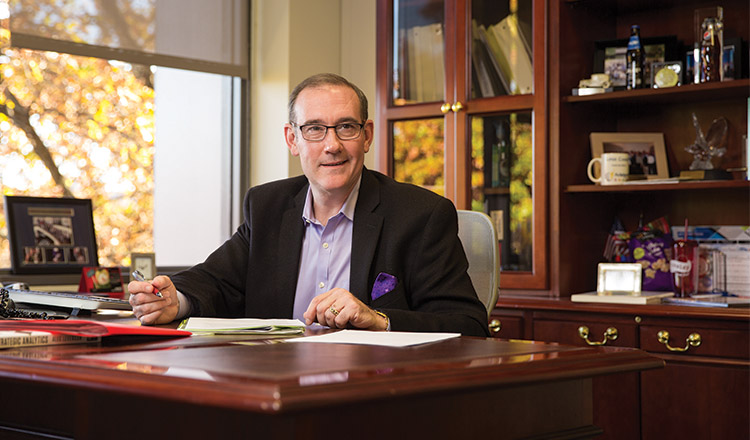Human resources professionals deal with the core of any strong business — human capital. Without a strategy to motivate and retain employees, even the most in-demand company can fail.
For a multi-billion-dollar corporation like PepsiCo with a workforce that spans economic backgrounds, education levels, and geographic regions, human resources officers play a significant role in the continued success of the organization. For Patrick McLaughlin (LA ’88, MA LA ’91), senior vice president of human resources at PepsiCo’s Frito-Lay business unit, the field is a perfect blend of behavior theory and analytics.
Throughout his nearly 20-year career with the beverage and food giant, he has applied his expertise in organizational sciences to connect with the company’s varied employee base and impact the bottom line.
“The higher you move in an organization, the more you have to understand what the overall strategy of the business is,” says McLaughlin. “Human resources is about understanding the interface between individual behavior and organizational behavior to get people motivated and focused to succeed. You look at how you create incentives, how you structure their careers, how you transmit the values of the organization to them, and how they mesh with their own personal values. People can give either a lot of discretionary effort or very little.”
“Human resources is about understanding the interface between individual behavior and organizational behavior to get people motivated and focused to succeed.”
—Patrick McLaughlin
For McLaughlin, success means translating the needs of the company to its employees in a way that will enhance morale and drive growth across all sectors.
That’s a skill that Michele Thatcher, McLaughlin’s mentor and senior vice president for global employment law at PepsiCo, says he has mastered. “We had a commission-based pay system before, but Patrick was able to create a system that ties individual employee goals to the company’s financial plans,” she says, citing his forethought into changing the front-line delivery system to improve company costs and enhance incentives for motivated employees. “Patrick led us to create a new incentive system that encouraged increased focus from every salesperson to exceed their goals and drive greater returns for the company,” Thatcher says. “It allows front-line employees to grow their pay but it ties it to business growth. He helped develop the road map to get us there.”
These days, McLaughlin is playing a role in recruiting for PepsiCo as well. Several times per year, he visits Purdue University, where he is an executive sponsor of PepsiCo’s recruiting relationship. He visits with deans and department heads in a variety of disciplines campus-wide as well as at the LGBTQ student center.
“It’s important to us to have that visibility on campus,” he says. “That’s part of our passion. We want to capture as diverse a workforce as we can, in thought, style, and skills.”

